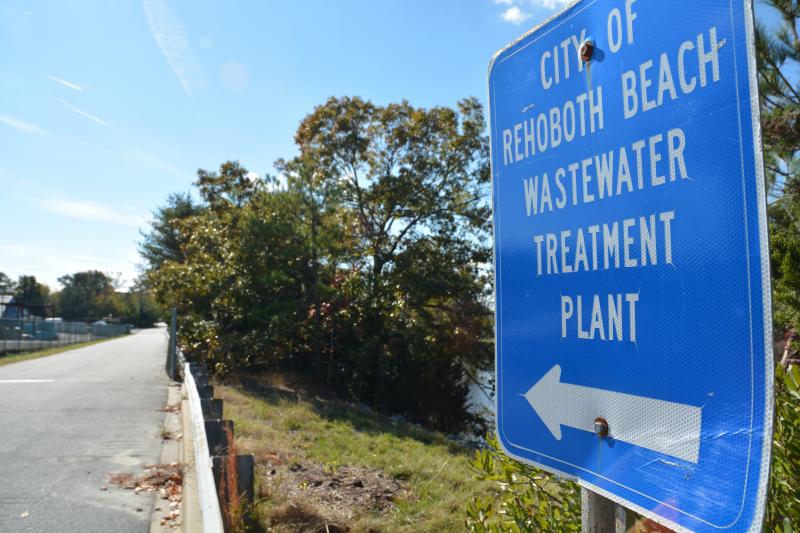As proposed, Rehoboth against county connection to outfall
Rehoboth Beach commissioners aren’t completely opposed to working with Sussex County to see if an agreement can be reached that allows the county to connect a sewer line for treated effluent into a city-owned ocean outfall pipe that carries the city’s treated effluent. However, they are opposed to the county purchasing that connection.
This would be forever, said Commissioner Jay Lagree. Once they get that permit, it’s never coming back, and there would be nothing at all the city could do, he said.
“Why do we have to sell this?” asked Lagree during a special commissioner meeting Jan. 10.
Rehoboth Beach officials announced in October that the county had approached them about tapping into the city’s ocean outfall, which goes one mile out into the ocean due east of Deauville Beach and is the end point for all the effluent processed by Rehoboth’s canal-side wastewater treatment plant on the opposite side of the city.
The county proposed a one-time $7.6 million payment for the ability to do two things – connect a pipe to carry up to 2 million gallons of treated effluent per day from its Wolfe Neck Regional Wastewater Facility into the city outfall system, and use two-fifths of the waste load allocation the city is permitted to have by the state. The city’s permit allows for a daily average of 425 pounds each of biological oxygen demand and solids to be discharged from the outfall. Testing since the outfall began working in 2018 shows that less than 50 pounds of each pollutant are being pumped daily.
During a meeting in November, Jeff Sturdevant, a representative from the city’s consultant GHD, said if the county was allowed to hook into the outfall, the total amount of each pollutant would be at or slightly above 50 pounds daily by 2024. By 2027, he said, the projected amount would still be less than 100 pounds daily.
Related to flow from the outfall, Sturdevant said the system has 4 million gallons per day of excess capacity right now. He said the pumps at the city’s wastewater plant have the capacity to move 7.5 million gallons a day, but the plant is designed to treat about 3.5 million gallons a day.
The Jan. 10 meeting was the second since a mid-November presentation from county officials, who have requested a decision from the city by the end of the first quarter of 2022 so the county can begin to apply for the required permitting. If approved, the connection would still take years build and obtain permits for.
To begin the meeting, Mayor Stan Mills said he and other senior city officials met with Delaware Department of Natural Resources and Environmental Control Secretary Shawn Garvin about the county’s proposal. Other than saying he thought it would take two permits, the secretary was unable to provide comments without a specific proposal, said Mills. To date, there’s only been public discussion on the subject, and no specific written proposal has been given to the city from the county.
Commissioners got to the point soon after Mills concluded his opening comments. One by one, they voiced their concerns about losing control of what’s coming out of the outfall if the county was allowed to purchase the ability to hook into it. They also voiced concerns about the county appearing unwilling to negotiate the purchase agreement, as opposed to a long-term lease agreement.
At a previous meeting, the county explained the specifics of how they got to $7.6 million – it’s a doubling of the unit cost per 1 million daily gallons. Commissioner Edward Chrzanowski said that amount should be the starting point, and there should be a premium placed on the ability to connect to the outfall.
Prior to voting, Public Works Director Kevin Williams said something to consider is if the county connects its Wolfe Neck treatment plant to another one of its treatment plants in response to not being able to hook into the outfall. The county is charged by the amount of flow coming through the city’s plant right now, and if that were to go down, the costs would increase for customers within the city, he said, adding those costs would be in addition to the future increase already planned for infrastructure improvements.
Lagree, who has questioned the proposal from the very beginning, said he didn’t think that would be too much of a problem because of the area communities that use the city’s treatment plant already – Henlopen Acres, North Shores, Dewey Beach and West Rehoboth. It would be too difficult and too expensive for the county to remove that flow from the city’s plant, he said.
Ultimately, commissioners voted against three motions – one related to the one-time purchase, one related to the $7.6 million offered, and one related to DNREC’s administration of the permitting process. Commissioners did vote in favor of supporting the 2 million gallons a day portion of the proposal.
It’s a good idea, but let’s see if it can be moved forward with a long-term lease, said Chrzanowski.
After the meeting, County Administrator Todd Lawson said he and county staff will discuss the proposal internally and respond to the city with their decision in the near future.
“We need to make sure we make the best long-term decision for our current and future customers,” said Lawson in an email Jan. 12. “Regardless of the outcome, I want to personally thank Mayor Mills for his willingness to have this offer considered and for the commissioners’ thorough review of this matter.”
Chris Flood has been working for the Cape Gazette since early 2014. He currently covers Rehoboth Beach and Henlopen Acres, but has also covered Dewey Beach and the state government. He covers environmental stories, business stories and random stories on subjects he finds interesting, and he also writes a column called Choppin’ Wood that runs every other week. He’s a graduate of the University of Maine and the Landing School of Boat Building & Design.






















































